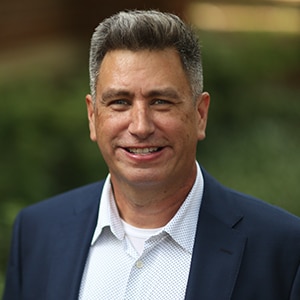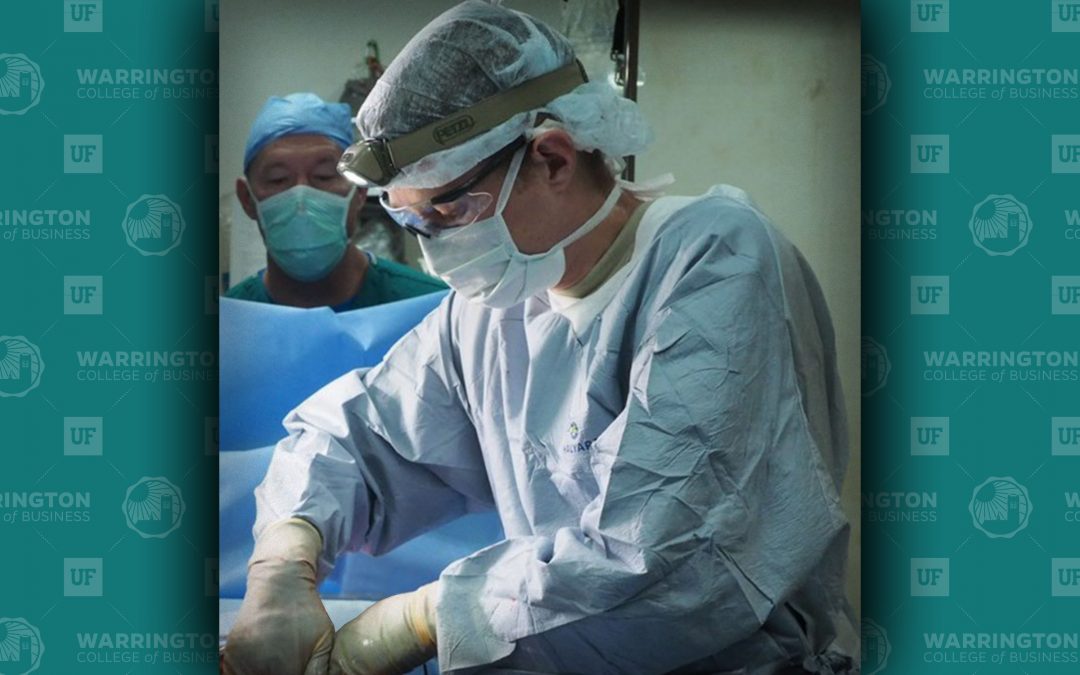Medicine, business collaboration spurs solution for battlefield blood supply and distribution
UF MBA student and Air Force surgeon Lt. Col. Andrew Hall partnered with Warrington professor Mike Carrillo for insights on how to better supply military missions with the crucial blood supply needed to save wounded soldiers.
As a surgeon in the United States Air Force, Lt. Col. Andrew Hall (MBA ’24) understands how critical of a resource blood is to treat combat casualties. As part of his work with the United States Central Command (USCENTCOM), Lt. Col. Hall was looking for a way to better support military missions with the vital blood supply needed to save the lives of U.S. service members who had been seriously injured in combat or other military exercises.
“Blood is a finite resource and the best ways to supply and utilize the resource is of great interest,” he explained.
The obstacles of supplying blood in combat situations are immense, including limited shelf life, transportation and storage requirements, and safety regulations, among others. But Lt. Col. Hall’s goal was straightforward – find a way to supply an appropriate quantity of blood to match the scope of needed care.
The Medical Challenge

Air Force Lt. Col. Andrew Hall
Previously, USCENTCOM had focused on providing what is called component therapy, which is the therapeutic use of blood components, like plasma, red blood cells and platelets. Component therapy, though, proved not to be the ideal solution in expeditionary environments.
When resuscitating a casualty, blood components are mixed with specific ratios in order to mimic whole blood. Because of this method, platelets, which have the shortest shelf-life, are the lynchpin to success of the entire process. Historically, most patients did not receive platelets.
Whole blood, though, is blood that hasn’t been filtered into components. Because whole blood contains all functional components and has a more stable shelf-life, it was identified as the ideal option for combat situations. Since low-titer type O blood can be given to all patients, it has become the standard blood product for expeditionary resuscitation.
While previous research had identified whole blood as the best option for resuscitation, Lt. Col. Hall’s research was focused on how to develop a system that would best distribute a limited supply of blood and minimize the amount of blood needing to be destroyed.
The Business Solution

Clinical Assistant Professor Michael Carrillo
With much of his education focused on medical care, Lt. Col. Hall recognized that he needed a partner who understood supply chain management. As a student in the University of Florida’s MBA program, he didn’t have to look far.
Michael Carrillo, Clinical Assistant Professor at the University of Florida Warrington College of Business, happened to be teaching Lt. Col. Hall in one of his classes. As someone who served in both the U.S. Air Force and U.S. Navy, Carrillo found Lt. Col. Hall’s project particularly interesting and was eager to get involved after Lt. Col. Hall approached him about joining the research team.
“With experience serving in two military branches, I have a lasting impression on the complex challenges the military addresses,” Carrillo explained. “Whether for combat operations or humanitarian efforts, the military consistently engages with issues beyond impacting broader, more significant causes. When [Lt. Col. Hall] expressed his research interest and shared the fascinating issues he was exploring, I was immediately captivated.”
With a background in supply chain and authorship of many of his own research papers, Carrillo had the insights that Lt. Col. Hall needed to finalize his research, which was recently published in Military Medicine.
Ultimately, Lt. Col. Hall and Carrillo, along with medical personnel at USCENTCOM, Uniformed Services University and the Air Force Medical Agency, devised a strategy to optimize the amount of blood distributed in expeditionary environments based on the number of operating beds and point of injury teams, which carry blood while on high-risk military operations.
With their strategy, they reduced packed red blood cell orders by 54%, and the Armed Services Blood Program updated their supply to include more whole blood, resulting in a decrease of expired blood products and increased whole blood production capacity to be used in casualty care.
As someone who regularly publishes research that has practical support to USCENTCOM missions, Lt. Col. Hall is particularly grateful for Carrillo’s assistance with the paper.
“I do a lot of research, and finding collaborators that are willing to meaningfully contribute is hard,” he shared. “I am happy to continue to work with UF faculty on projects for the military that can make sure our expeditionary forces are best able to carry out whatever mission our government gives them. There are many opportunities for research.”
In fact, Lt. Col. Hall and Carrillo have already started pursuing additional research projects that focus on expanding their most recent insights into other military, humanitarian and crisis management operations. Carrillo noted how both military and civilian uses of insights like these between cross-disciplinary partners motivates him to continue his work with Lt. Col. Hall.
“This situation presents a compelling example of applied interdisciplinary research between medicine and business,” he said. “As a business clinical researcher committed to exploring and contributing to such cross-disciplinary studies, I am eager to further this mission by pursuing additional research with Lt. Col. Hall.”




